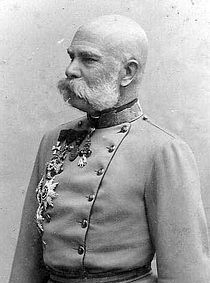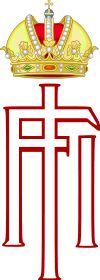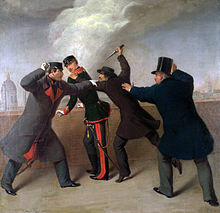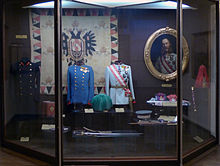Franz Joseph I of Austria - Picture
More about World War 1

|
|
Franz Joseph I of Austria
Franz Joseph I

Picture - Emperor Franz Joseph, 1885
: Emperor of Austria; Apostolic King of Hungary; King of Bohemia; King of Croatia; King of Galicia and Lodomeria; Grand Duke of Cracow
Reign: 2 December 1848 - 21 November 1916
Predecessor: Ferdinand I
Successor: Charles I
:
Spouse: Elisabeth of Bavaria
Issue:
: Archduchess Sophie
Archduchess Gisela
Rudolf, Crown Prince of Austria
Archduchess Marie-Valerie
House: House of Habsburg-Lorraine
Father: Archduke Franz Karl of Austria
Mother: Princess Sophie of Bavaria
Born: 18 August 1830(1830-08-18)
Schonbrunn Palace Vienna
Died: 21 November 1916(1916-11-21) (aged 86)
Schonbrunn Palace
Franz Joseph I or Francis Joseph I (German: Franz Josef I., Hungarian: I. Ferenc Jx³zsef, see the name in other languages; 18 August 1830 - 21 November 1916) was Emperor of Austria, King of Bohemia, King of Croatia and Apostolic King of Hungary from 1848 until his death in 1916, King of Galicia and Lodomeria, Grand Duke of Cracow.
In the December of 1848, Emperor Ferdinand I of Austria abdicated the throne as part of Ministerprx¤sident Felix zu Schwarzenberg's plan to end the Revolutions of 1848 in Austria, which allowed Ferdinand's nephew Franz Joseph to ascend to the throne. Largely considered to be a reactionary, Franz Joseph spent his early reign resisting constitutionalism in his domains. The Austrian Empire was forced to cede most of its claim to Lombardy-Venetia to the Kingdom of Piedmont-Sardinia following the conclusion of the Second Italian War of Independence in 1859, and the Third Italian War of Independence in 1866. Although Franz Joseph ceded no territory to the Kingdom of Prussia after the Austrian defeat in the Austro-Prussian War, the Peace of Prague (23 August 1866) settled the German question in favor of Prussia, which prevented the unification of Germany under the House of Habsburg (Groxdeutsche Losung).
Franz Joseph was troubled by nationalism during his entire reign. He concluded the Ausgleich of 1867, which granted greater autonomy to Hungary, hence transforming the Austrian Empire into the Austro-Hungarian Empire under his Dual Monarchy. His domains were then ruled peacefully for the next 45 years, although Franz Joseph's personal life became increasingly tragic after the suicide of his son, the Crown Prince Rudolf in 1889, and the assassination of his wife, the Empress Elizabeth in 1898.
After the Austro-Prussian War, Austria-Hungary turned its attention to the Balkans, which was a hotspot of international tension due to conflicting interests with the Russian Empire. The Bosnian crisis was a result of Franz Joseph's annexation of Bosnia and Herzegovina in 1908, which had been occupied by his troops since the Congress of Berlin (1878). On 28 June 1914, the assassination of the heir to the Austro-Hungarian throne, the Archduke Franz Ferdinand, at the hands of Gavrilo Princip, a Serbian nationalist, resulted in Austria-Hungary's declaration of war against the Kingdom of Serbia, which was Russia's ally. This activated a system of alliances which resulted in World War I.
Franz Joseph died on 21 November 1916, after ruling his domains for almost 68 years. He was succeeded by his grandnephew Karl.
Early life

Picture - Imperial Monogram
Franz Josef was born in the Schonbrunn Palace in Vienna, the oldest son of Archduke Franz Karl (the younger son of Holy Roman Emperor Francis II), and his wife Princess Sophie of Bavaria. Because his uncle, from 1835 the Emperor Ferdinand, was weak-minded, and his father unambitious and retiring, the young Archduke "Franzl" was brought up by his mother as a future Emperor with emphasis on devotion, responsibility and diligence. Franzl came to idolise his grandfather, der Gute Kaiser Franz, who had died shortly before the former's fifth birthday, as the ideal monarch. At the age of 13, young Archduke Franz started a career as a colonel in the Austrian army. From that point onward, his fashion was dictated by army style and for the rest of his life he normally wore the uniform of a junior officer.
Franz Josef was soon joined by three younger brothers: Archduke Ferdinand Maximilian (born 1832, the future Emperor Maximilian of Mexico); Archduke Karl Ludwig (born 1833), and Archduke Ludwig Viktor (born 1842), and a sister, Maria Anna (born 1835), who died at the age of four.
Following the resignation of the Chancellor Prince Metternich during the Revolutions of 1848, the young Archduke, who it was widely expected would soon succeed his uncle on the throne, was appointed Governor of Bohemia on 6 April, but never took up the post. Instead, Franz was sent to the front in Italy, joining Field Marshal Radetzky on campaign on 29 April, receiving his baptism of fire on 5 May at Santa Lucia. By all accounts he handled his first military experience calmly and with dignity. Around the same time, the Imperial Family was fleeing revolutionary Vienna for the calmer setting of Innsbruck, in Tyrol. Soon, the Archduke was called back from Italy, joining the rest of his family at Innsbruck by mid-June. It was at Innsbruck at this time that Franz Joseph first met his cousin Elisabeth, Duchess in Bavaria, his future bride, then a girl of ten, but apparently the meeting made little impact.
Following victory over the Italians at Custoza in late July, the court felt safe to return to Vienna, and Franz Josef travelled with them. But within a few months Vienna again appeared unsafe, and in September the court left again, this time for Olmx¼tz in Moravia. By now, Alfred I, Prince of Windisch-Grx¤tz, the influential military commander in Bohemia, was determined to see the young Archduke soon put onto the throne. It was thought that a new ruler would not be bound by the oaths to respect constitutional government to which Ferdinand had been forced to agree, and that it was necessary to find a young, energetic emperor to replace the kindly, but mentally unfit Emperor.
It was thus at Olmx¼tz on 2 December that, by the abdication of his uncle Ferdinand and the renunciation of his father, the mild-mannered Franz Karl, Franz Joseph succeeded as Emperor of Austria. It was at this time that he first became known by his second as well as his first Christian name. The name "Franz Joseph" was chosen deliberately to bring back memories of the new Emperor's great-granduncle, Emperor Joseph II, remembered as a modernising reformer.
Imperial absolutism, 1848-1860
Under the guidance of the new prime minister Prince Schwarzenberg, the new emperor at first pursued a cautious course, granting a constitution in early 1849. At the same time, military campaigns were necessary against the Hungarians, who had rebelled against Habsburg central authority under the name of their ancient liberties. Franz Joseph was also almost immediately faced with a renewal of the fighting in Italy, with King Charles Albert of Sardinia taking advantage of setbacks in Hungary to resume the war in March 1849. Soon, though, the military tide began to turn in favor of Franz Joseph and the Austrian whitecoats. Almost immediately, Charles Albert was decisively beaten by Radetzky at Novara, and forced both to sue for peace and to abdicate his throne. In Hungary, the situation was more grave and Austrian defeat was quite possible. Franz Joseph, sensing a need to secure his right to rule sought help from Russia, requesting the intervention of Tsar Nicholas I, in order "to prevent the Hungarian insurrection developing into a European calamity." Russian troops entered Hungary in support of the Austrians and the revolution was crushed by late summer of 1849. With order now restored throughout the Empire, Franz Joseph felt free to go back on the constitutional concessions he had made, especially as the Austrian parliament, meeting at Kremsier, had behaved, in the young Emperor's view, abominably. The 1849 constitution was suspended, and a policy of absolutist centralism was established, guided by the Minister of the Interior, Alexander Bach.
The next few years saw the seeming recovery of Austria's position on the international scene following the near disasters of 1848-1849. Under Schwarzenberg's guidance, Austria was able to stymie Prussian scheming to create a new German Federation under Prussian leadership, excluding Austria. After Schwarzenberg's premature death in 1852, he could not be replaced by statesmen of equal stature, and the Emperor effectively took over himself as prime minister.
Assassination attempt in 1853

Picture - Assassination attempt on the Emperor, 1853
On 18 February 1853, the Emperor survived an assassination attempt by Hungarian nationalist Jx¡nos Libényi. The emperor was taking a stroll with one of his officers, Maximilian Karl Lamoral O'Donnell, on a city-bastion, when Libényi approached him. He immediately struck the emperor from behind with a knife straight at the neck. Franz Joseph almost always wore a uniform, which had a high collar that almost completely enclosed the neck. It so happened that the collar of his uniform was made out of very sturdy material. Even though the Emperor was wounded and bleeding, the collar saved his life. Count O'Donnell (descendant of the Irish noble dynasty O'Donnell of Tyrconnell) struck Libényi down with his sabre. O'Donnell, hitherto only a Count by virtue of his Irish nobility, was thereafter made a Count of the Habsburg Empire, conferred with the Commander's Cross of the Royal Order of Leopold, and his customary O'Donnell arms were augmented by the initials and shield of the ducal House of Austria, with additionally the double-headed eagle of the Empire. These arms are emblazoned on the portico of no. 2 Mirabel Platz in Salzburg, where O'Donnell built his residence thereafter. Another witness who happened to be nearby, the butcher Joseph Ettenreich, quickly overwhelmed Libényi. For his deed he was later elevated to nobility by the Emperor and became Joseph von Ettenreich. Libényi was subsequently put on trial and condemned to death for attempted regicide. He was executed on the Simmeringer Haide. After the unsuccessful attack the Emperor's brother Ferdinand Maximilian Joseph, the later Emperor of Mexico, called upon Europe's Royal families for donations to a new church on the site of the attack. The church was to be a votive offering for the rescue of the Emperor. It is located on Ringstraxe in the district of Alsergrund close to the University of Vienna, and is known as the Votivkirche.
Family life
It was generally felt in the court that the Emperor should marry and produce heirs as soon as possible. Various potential brides were considered: Princess Elisabeth of Modena, Princess Anna of Prussia and Princess Sidonia of Saxony. Although in public life the Emperor was the unquestioned director of affairs, in his private life his formidable mother still had a crucial influence. She wanted to strengthen the relationship between the Houses of Habsburg and Wittelsbach, and hoped to match Franz Joseph with her sister Ludovika's eldest daughter, Helene ("Nené"), four years the Emperor's junior. However, the Emperor became besotted with Nené's younger sister, Elisabeth ("Sisi"), a girl of sixteen, and insisted on marrying her instead. Sophie acquiesced, despite some misgivings about Sisi's appropriateness as an imperial consort, and the young couple were married on 24 April 1854 in St. Augustine's Church, Vienna.
Their married life was not happy. Sisi never really adapted herself to the court and always had disagreements with the Imperial Family; their first daughter Sophie died as an infant; and their only son, Crown Prince Rudolf, died, allegedly by suicide in 1889, in the infamous Mayerling Incident. The Empress was an inveterate traveller, horsewoman, and fashion maven who was rarely seen in Vienna. She was stabbed to death by an Italian anarchist in 1898; Franz Joseph never fully recovered from the loss. According to the future Empress-Consort Zita of Bourbon-Parma he usually told his relatives: "You'll never know how important she was for me" or, according to some sources, "She will never know how much I loved her" (although there is no definite proof he actually said this).
The 1850s witnessed several failures of Austrian external policy: the Crimean War and break-up with Russia, and defeat in the Second Italian War of Independence. The setbacks continued in the 1860s with defeat in the Austro-Prussian War of 1866, which resulted in the Austro-Hungarian Compromise of 1867.
Political difficulties in Austria mounted continuously through the late 1800s and into the 20th century. But Franz Joseph remained immensely respected. His patriarchal authority held the Empire together while the politicians squabbled.
Later reign and death
In 1885 Franz Joseph met Katharina Schratt, a leading actress of the Vienna stage, and she became his mistress. This relationship lasted the rest of his life, and was, to a certain degree, tolerated by Sisi. Franz Joseph built Villa Schratt in Bad Ischl for her, and also provided her with a small palace in Vienna.
After the death of Rudolf, the heir to the throne was his nephew Archduke Franz Ferdinand. When Franz Ferdinand decided to marry a mere countess, Franz Joseph opposed the marriage strenuously, and insisted that it must be morganatic; he did not even attend the wedding. After that, the two men disliked and distrusted each other.
In 1903, Franz Joseph's veto of Cardinal Rampolla's election to the papacy was transmitted to the conclave by Cardinal Jan Puzyna. It was the last use of such a veto, because new Pope Pius X provided penalties for such.
In 1914, Franz Ferdinand was assassinated in Sarajevo, leading to World War I. When he heard the news of the assassination, Franz Joseph said that "in this manner a superior power has restored that order which I unfortunately was unable to maintain."
Franz Joseph died in the Schonbrunn Palace in 1916, aged 86, in the middle of the war. He was succeeded by his grandnephew Karl. But two years later, after defeat in World War I, the Austro-Hungarian Monarchy dissolved.
His 68-year reign is the third-longest in the recorded history of Europe (after those of Louis XIV of France and Johannes II, Prince of Liechtenstein).
Gallery
Emperor Franz Joseph being greeted, circa 1910
Monument to Franz Joseph I, Chernivtsi, Ukraine. Skulptor Volodymyr Tsisaryk and Ivanov I. Sergiy
Issue
Ancestors
Orders, decorations, and honors
Emperor Franz Joseph held the following chivalric orders:
Order of the Golden Fleece (ex officio as Emperor of Austria)
Military Order of Maria Theresa (Militx¤r Maria-Theresien-Orden, ex officio as Emperor of Austria)
Royal Hungarian Order of Saint Stephen (Koniglich ungarischer St. Stephan-Orden, ex officio as Emperor of Austria)
Order of Leopold (Leopold-Orden, ex officio as Emperor of Austria)
Order of the Iron Crown (Orden der Eisernen Krone, ex officio as Emperor of Austria)
Order of the Garter, Great Britain, awarded 1867 and expelled 1914
Order of the Black Eagle (Schwarzer-Adler-Orden), Prussia
Order of the Red Eagle (Roter-Adler-Orden), First Class, Prussia
Pour le Mérite (Orden Pour le Mérite, the "Blue Max"), Prussia
Royal House Order of Hohenzollern (Koniglich Hausorden von Hohenzollern), Prussia
He founded the following orders:
Order of Franz Joseph (Franz Joseph-Orden), 1849
Order of Elizabeth (Elizabeth-Orden), 1898
He held the following honorary appointments:
Colonel-in-chief, 1st (The King's) Dragoon Guards, British Army, 25 March 1896 - 1914
Colonel-in-chief, Kexholm Life Guards Grenadier Regiment, Russian Army, until 26 June 1914
Colonel-in-chief, 12th Belgorod Lancer Regiment, Russian Army, until 26 June 1914
Colonel-in-chief, 16th (Schleswig-Holstein) Hussars, German Army
Colonel-in-chief, 122nd (Emperor Francis Joseph of Austria, King of Hungary (4th Wx¼rttemberg) Fusiliers
Field Marshal, British Army, 1 September 1903 - 1914
Legacy
The archipelago Franz Josef Land in the Russian high Arctic was named in his honor in 1873. Franz Josef Glacier in New Zealand's South Island also bears his name.
Franz Joseph founded in 1872 the Franz Joseph University (Hungarian: Ferenc Jx³zsef Tudomx¡nyegyetem, Romanian: Universitatea Francisc Iosif) in the city of Cluj-Napoca (at that time a part of Austria-Hungary under the name of Kolozsvx¡r). The university was moved to Szeged after Cluj became a part of Romania, becoming the University of Szeged.
Official Grand Title
His Imperial and Royal Apostolic Majesty,
Franz Joseph I, by the Grace of God Emperor of Austria, King of Hungary, Bohemia, King of Lombardy and Venice, of Dalmatia, Croatia, Slavonia, Galicia, Lodomeria and Illyria; King of Jerusalem etc., Archduke of Austria; Grand Duke of Tuscany and Cracow, Duke of Lorraine, of Salzburg, Styria, Carinthia, Carniola and of the Bukovina; Grand Prince of Transylvania; Margrave of Moravia; Duke of Upper and Lower Silesia, of Modena, Parma, Piacenza and Guastalla, of Auschwitz, Zator and Teschen, Friuli, Ragusa (Dubrovnik) and Zara (Zadar); Princely Count of Habsburg and Tyrol, of Kyburg, Gorizia and Gradisca; Prince of Trent (Trento) and Brixen; Margrave of Upper and Lower Lusatia and in Istria; Count of Hohenems, Feldkirch, Bregenz, Sonnenberg, etc.; Lord of Trieste, of Cattaro (Kotor), and over the Windic march; president of The German Confederation.
After 1867:
His Imperial and Royal Apostolic Majesty,
Francis Joseph I, by the grace of God Emperor of Austria; Apostolic King of Hungary, King of Bohemia, Dalmatia, Croatia, Slavonia, Galicia, Lodomeria, Illyria; King of Jerusalem, etc.; Archduke of Austria; Grand Duke of Tuscany, Crakow; Duke of Lorraine, Salzburg, Styria, Carinthia, Carniola, the Bukovina; Grand Prince of Transylvania; Margrave of Moravia; Duke of the Upper & Lower Silesia, Modena, Parma, Piacenza, Guastalla, Oswiecin, Zator, Cieszyn, Friuli, Ragusa, Zara; Princely Count of Habsburg, Tyrol, Kyburg, Gorizia, Gradisca; Prince of Trent, Brixen; Margrave of the Upper & Lower Lusatia, in Istria; Count of Hohenems, Feldkirch, Bregenz, Sonnenberg, etc.; Lord of Triest, Kotor, the Wendish March; Grand Voivode of the Voivodship of Serbia etc. etc..
Personal motto
mit vereinten Krx¤ften (German) = Viribus Unitis (Latin) = "With united forces" (as the Emperor of Austria). A homonymous war ship existed.
Bizalmam az Åsi Erényben (Hungarian) = Virtutis Confido (Latin) = "My trust in [the ancient] virtue" (as the Apostolic King of Hungary)
Names in other languages

Picture - Uniforms and other items of the Emperor at the Heeresgeschichtliches Museum Wien
Basque: Frantzizko Josepe
Breton: Frax±sez Jozef
Bulgarian: ФÑÐ°Ð½Ñ ÐоÑиÑ
Croatian: Franjo Josip
Czech: Frantiek Josef
Dutch: Frans Jozef
Esperanto: Francisko Jozefo
Estonian: Franciscus Joosep
French: Franx§ois-Joseph Ier
Friulian: Francesc Josef
Galician: Francisco Xosé
German: Franz Josef
Greek: ΦÏαγκίÏÎºÎ¿Ï ÎÏÏÎ®Ï Î'
Hungarian: Ferenc Jx³zsef
Irish: Proinsias Seosamh
Italian: Francesco Giuseppe
Latin: Franciscus Iosephus
Latvian: Francis Jozefs
Lithuanian: Prancikus Juozapas
Norwegian: Frans Josef
Polish: Franciszek Jx³zef
Portuguese: Francisco José
Romanian: Francisc Iosif
Russian: ФÑÐ°Ð½Ñ ÐоÑиÑ
Scottish Gaelic: Frang Sex²saidh
Sicilian: Franciscu Giuseppi
Serbian: ФÑаÑа ÐоÑÐ¸Ñ / Franja Josif
Slovene: Franc Jožef
Slovak: Frantiek Jozef
Ukrainian: ФÑÐ°Ð½Ñ ÐоÑиÑ
Spanish: Francisco José
Welsh: Ffransis Joseff
Nicknames
Italian: Ceccobeppe, Cecco Beppe or Cecco Peppe (various dialectal forms) from shortened forms of Francesco Giuseppe, used mockingly, especially by Italian troops who fought during World War I. There is also a pacifist poem written by Italian poet Trilussa, "Ninna nanna de la guerra" ("War's lullaby"), where Franz Joseph is called Cecco Peppe.
Czech: Starej Prochx¡zka (Old Prochazka or "Walker") or Frantiek Prochx¡zka (Francis Prochx¡zka/"Walker"). Prochx¡zka is a common Czech surname which approximates to the English "Walker". It was applied to Franz Joseph after his visit to Prague in 1901 when a picture of him crossing a bridge on foot was published in Czech newspapers with the caption: "Strolling on a bridge" (Czech: "Prochx¡zka na mostÄ")). This, however, may be an urban legend. According to some historians, Franz Joseph was called Starej Prochx¡zka much earlier than 1901, the reason being that his arrival was being announced by a cavalryman named Prochx¡zka.
Hungarian: Ferenc Jx³ska, in which Jx³ska means Joey, mocking his young age when he became the ruler and later his old aged image of an old uncle of the people.
References in popular culture
In Robert Musil's novel The Man Without Qualities, a central part of the plot deals with the (ultimately futile) preparations for the seventieth anniversary of Franz Joseph's reign.
The satirical Czech anti-war novel The Good Soldier Å vejk of 1932, by Jaroslav Haek, satirized with comic absurdity, the aging monarch as Old Prochazka, as being totally out of touch with the times.
Radetzkymarsch (The Radetzky March), a 1932 novel by the Austrian writer Joseph Roth, where he is portrayed as a lonely, forgetful, ageing autocrat, awaiting death.
Sissi, a 1955 film depicting the fictionalized and romanticized idyll between a young Franz Joseph and Elisabeth of Bavaria. Franz Joseph was played by Karlheinz Bohm.
Kenneth MacMillan's 1978 ballet, Mayerling
The Michael Kunze/Sylvester Levay musical Elisabeth portrays Franz Joseph's marriage with Elisabeth as a love triangle between the two and Death.
The Illusionist, a 2006 film where a fictional son of Franz Joseph plans to overthrow him. Franz Joseph does not actually appear in the film, but the illusionist magically creates a painting of the emperor to impress the fictional prince's court.
Frequent references are made to a stamp of Franz Josef I in Bruno Schulz's short story "Spring."
Franz Joseph appears frequently in the novel Flashman and the Tiger by George MacDonald-Fraser. (1999/Harper Collins).
In Episode 6 of Hidekaz Himaruya's anime series, Hetalia: Axis Powers, Franz Joseph is referenced extensively by the character Austria, who praises his frugality.
In the Tom and Jerry episode, Johann Mouse, there is a very accurate depiction of Franz Joseph I.
Indirect mention by Anna Wolfe in the 1997 video game The Last Express.
Rulers of Germany family tree. He was related to every other ruler of Germany.
Further reading
Beller, Steven. Francis Joseph. Profiles in power. London: Longman, 1996.
Bled, Jean-Paul. Franz Joseph. Oxford: Blackwell, 1992.
Cunliffe-Owen, Marguerite. Keystone of Empire: Francis Joseph of Austria. New York: Harper, 1903.
Gero, Andrx¡s. Emperor Francis Joseph: King of the Hungarians. Boulder, Colo.: Social Science Monographs, 2001.
Palmer, Alan. Twilight of the Habsburgs: The Life and Times of Emperor Francis Joseph. New York: Weidenfeld & Nicolson, 1995.
Redlich, Joseph. Emperor Francis Joseph Of Austria. New York: Macmillan, 1929.
Van der Kiste, John. Emperor Francis Joseph: Life, Death and the Fall of the Habsburg Empire. Stroud, England: Sutton, 2005.
More aircraft.
Source: WikiPedia